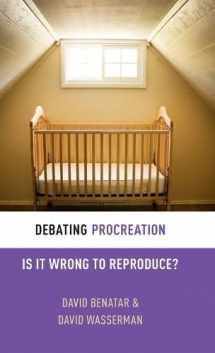
Debating Procreation: Is It Wrong to Reproduce? (Debating Ethics)
ISBN-13:
9780199333547
ISBN-10:
0199333548
Edition:
1
Author:
David Benatar, David Wasserman
Publication date:
2015
Publisher:
Oxford University Press
Format:
Hardcover
278 pages
FREE US shipping
Book details
ISBN-13:
9780199333547
ISBN-10:
0199333548
Edition:
1
Author:
David Benatar, David Wasserman
Publication date:
2015
Publisher:
Oxford University Press
Format:
Hardcover
278 pages
Summary
Debating Procreation: Is It Wrong to Reproduce? (Debating Ethics) (ISBN-13: 9780199333547 and ISBN-10: 0199333548), written by authors
David Benatar, David Wasserman, was published by Oxford University Press in 2015.
With an overall rating of 4.0 stars, it's a notable title among other
books. You can easily purchase or rent Debating Procreation: Is It Wrong to Reproduce? (Debating Ethics) (Hardcover) from BooksRun,
along with many other new and used
books
and textbooks.
And, if you're looking to sell your copy, our current buyback offer is $0.32.
Description
While procreation is ubiquitous, attention to the ethical issues involved in creating children is relatively rare. In Debating Procreation, David Benatar and David Wasserman take opposing views on this important question. David Benatar argues for the anti-natalist view that it is always wrong to bring new people into existence. He argues that coming into existence is always a serious harm and that even if it were not always so, the risk of serious harm is sufficiently great to make procreation wrong. In addition to these "philanthropic" arguments, he advances the "misanthropic" one that because humans are so defective and cause vast amounts of harm, it is wrong to create more of them.David Wasserman defends procreation against the anti-natalist challenge. He outlines a variety of moderate pro-natalist positions, which all see procreation as often permissible but never required. After criticizing the main anti-natalist arguments, he reviews those pronatalist positions. He argues that constraints on procreation are best understood in terms of the role morality of prospective parents, considers different views of that role morality, and argues for one that imposes only limited constraints based on the well-being of the future child. He then argues that the expected good of a future child and of the parent-child relationship can provide a strong justification for procreation in the face of expected adversities without giving individuals any moral reason to procreate


We would LOVE it if you could help us and other readers by reviewing the book
Book review

Congratulations! We have received your book review.
{user}
{createdAt}
by {truncated_author}


